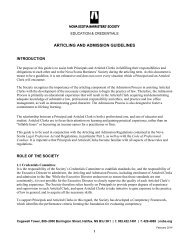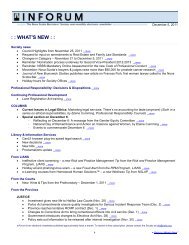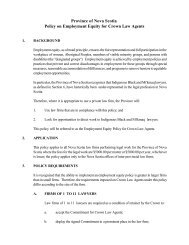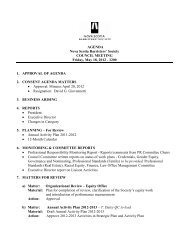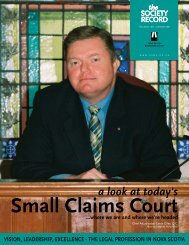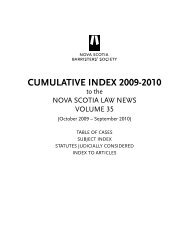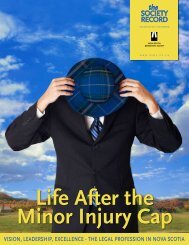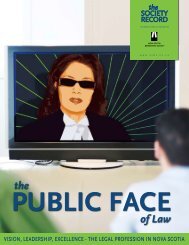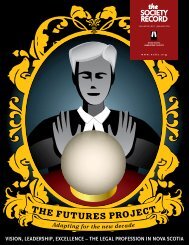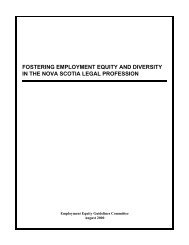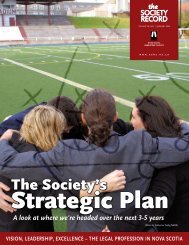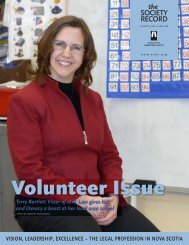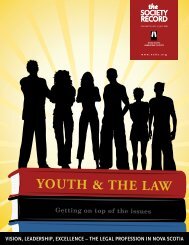SR Vol 27 No 4, October 2009 - Nova Scotia Barristers' Society
SR Vol 27 No 4, October 2009 - Nova Scotia Barristers' Society
SR Vol 27 No 4, October 2009 - Nova Scotia Barristers' Society
- No tags were found...
You also want an ePaper? Increase the reach of your titles
YUMPU automatically turns print PDFs into web optimized ePapers that Google loves.
A Message from Premier Darrell DexterIt’s a pleasure for me toparticipate in this commemorativepublication.First and foremost, all <strong>No</strong>va <strong>Scotia</strong>nsowe a deep debt of gratitude to thelate Donald Marshall Jr. for his quietstruggle to make the province abetter place for the Mi’kmaq. Hislegacy, through the changes thatoccurred as a result of the RoyalCommission and the 1999 SupremeCourt decision with respect toMi’kmaq treaty rights, has forever changed <strong>No</strong>va <strong>Scotia</strong>—for thebetter.As <strong>No</strong>va <strong>Scotia</strong>’s Premier and Minister of Aboriginal Affairstwo decades after the release of the Royal Commission on theDonald Marshall, Jr., Prosecution report, I am mindful of howthe recommendations have shaped the work of the provincialgovernment—in particular, government’s relationship with theMi’kmaq people of <strong>No</strong>va <strong>Scotia</strong> and how all <strong>No</strong>va <strong>Scotia</strong>nsinteract with the provincial justice system.<strong>No</strong>va <strong>Scotia</strong>’s relationship with the Mi’kmaq has changeddramatically in the last two decades. The seeds of thischange were sowed within the recommendations of the RoyalCommission. The recommendation that called for a “Tripartiteforum on Native issues” has evolved into what is now a robustgovernment to government relationship. The cornerstonesof this relationship are the Mi’kmaq - Canada - <strong>No</strong>va <strong>Scotia</strong>Tripartite Forum, the Made-in-<strong>No</strong>va <strong>Scotia</strong> negotiation processand a common approach to Consultation. Today, the Forumserves as a positive example of how we can successfully partnerto address issues of common concern in a manner based onmutual respect, partnership and commitment. Its three partiesare working closely together toward the goal of closing the gapin social and economic circumstances between Aboriginal andnon‐Aboriginal people.Members of the Tripartite Forum are dedicated to improvingthe lives of the Mi’kmaq and recognizing the contributionsthey bring to the province. The efforts of the Tripartite Forum’sseven working committees have resulted in achievements likeincreasing physical activity levels of Mi’kmaq youth, encouragingeconomic development in communities and helping to close thegaps in education and in health.Its evolution has been the result of a building process—buildingrelationships and new partnerships along with a new way ofworking together—one that other provinces and territories arewatching and beginning to replicate.With the signing of an Umbrella Agreement in 2002, the provincebegan to address long outstanding issues of Aboriginal and treatyrights through the Made-in-<strong>No</strong>va <strong>Scotia</strong> negotiation process anda commitment to establish common consultation processes.We have also seen the emergence of a respectful governmentto government relationship between the Assembly of <strong>No</strong>va<strong>Scotia</strong> Mi’kmaq Chiefs and the Government of <strong>No</strong>va <strong>Scotia</strong>. Theannual joint meeting of the Assembly and the provincial Cabinetis symbolic of this relationship.The Marshall Inquiry also led to the introduction of a communitybasedapproach to Mi’kmaq justice programs. The Mi’kmaq LegalSupport Network (MLSN) was formed through the tripartiterelationship between the provincial and federal governmentsand Mi’kmaq people—and their combined interest in protectingthe rights of Aboriginal people in the justice system in order toavoid future wrongful convictions.The MLSN is seen as a national leader in Aboriginal justiceand serves as an umbrella organization from which culturallyappropriate justice projects and programs are developed andimplemented. Two core programs currently offered by the MLSNare the Mi’kmaw Court Worker Program (which helps bridgethe gaps and eliminate cultural barriers between the justicesystem and Mi’kmaw people) and the Mi’kmaw Customary LawProgram (a culturally appropriate restorative justice programthat facilitates sentencing circles, community placements andreferrals to other programs and services). These programsare a direct result of recommendations contained in the RoyalCommission.While we are proud of these accomplishments, we recognizethat there is more work to be done.The Province will continue to pursue productive discussionsamong other levels of government, the Mi’kmaq and social,health, economic and justice organizations.We will maintain our focus on encouraging closer relationships thatwill inevitably lead to a greater mutual understanding and respect—with a common interest of building the future of <strong>No</strong>va <strong>Scotia</strong>.The Hon. Darrell DexterPremier of <strong>No</strong>va <strong>Scotia</strong>6 The <strong>Society</strong> Record



